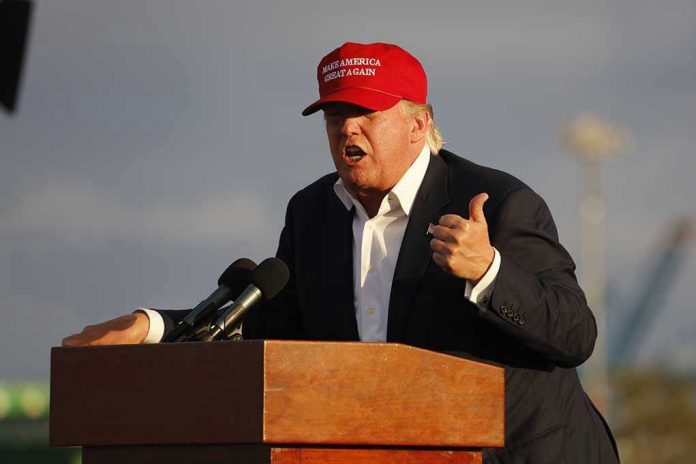
President Trump’s unprecedented federal takeover of D.C. law enforcement and National Guard deployment has ignited fierce debate over executive power, constitutional rights, and the future of crime policy in America.
Story Snapshot
- Trump federalizes D.C. Metro Police and deploys National Guard for 12 days, claiming dramatic crime reduction.
- Crime becomes the centerpiece of Trump’s 2026 election campaign, contrasting his approach with previous administrations.
- Federal intervention in local policing raises constitutional and legal concerns, with critics warning of government overreach.
- Independent verification of crime statistics and legality of actions remains pending, fueling ongoing controversy.
Federalization of D.C. Police and National Guard Deployment
President Donald Trump initiated an unprecedented federal intervention in Washington, D.C., directly taking control of the Metro Police Department and deploying National Guard units for domestic policing duties. The 12-day operation featured specialized National Guard patrols and rapid-response teams, with Defense Secretary Pete Hegseth overseeing implementation. Trump’s administration claims this decisive action resulted in a substantial reduction in major crimes, including a reported 46% drop in robbery, 83% decrease in carjackings, and 22% fall in violent crime. This federalization is a rare move in U.S. history, normally reserved for extraordinary situations such as civil rights crises or natural disasters.
Trump’s aggressive strategy marks a sharp contrast with previous administrations and local D.C. authorities, who typically handled crime through municipal governance and community-based initiatives. By placing federal control over local law enforcement, Trump underscores his “law-and-order” campaign narrative, positioning himself as the candidate capable of restoring safety and order where others have allegedly failed. This approach resonates with conservatives frustrated by years of rising urban crime, perceived leniency, and lack of accountability under left-leaning leadership. The rapid deployment of National Guard personnel for policing—not just emergency response—further highlights Trump’s readiness to use all available federal tools to combat urban disorder.
Legal and Constitutional Ramifications
President Trump’s intervention has sparked immediate legal and constitutional scrutiny. The Pentagon is actively reviewing the legality and operational requirements of Trump’s executive order, with military leadership divided over the expanded domestic role of National Guard forces. Critics, including retired Maj. Gen. Randy Manner, have labeled the move “100 percent political,” arguing that existing quick reaction forces were sufficient and that the federalization sets a dangerous precedent for future executive overreach. Legal scholars warn that such federal takeovers challenge foundational principles of local governance and civilian oversight, potentially eroding constitutional protections and individual liberties, especially if extended or replicated elsewhere.
Historically, federal intervention in local law enforcement has been controversial and limited, primarily deployed for civil rights enforcement or disaster response. No recent precedent exists for the wholesale federalization of a major city’s police department for crime reduction. The District of Columbia’s unique status allows for more direct federal action, but the scale and duration of Trump’s push have raised broader questions about the separation of powers and the role of the military in domestic affairs. Congressional oversight and future legal challenges are likely as the administration continues to tout its successes.
Political Impact and Campaign Strategy
Trump’s law-and-order approach has put crime at the forefront of the 2026 election, framing it as a campaign-defining issue. By claiming measurable achievements in crime reduction, Trump seeks to draw a clear line between his administration’s willingness to act and what he describes as Democratic inaction or tolerance for urban decay. His rhetoric—“We will make D.C. truly GREAT AGAIN!”—capitalizes on public frustration with perceived government overreach, inflation, and failed urban policies. Meanwhile, the lack of independent verification for the administration’s crime statistics remains a sticking point, with opponents questioning both the necessity and effectiveness of federal intervention.
Trump claims 'we're against crime. Democrats like crime' https://t.co/0oT5f2OnXs
— Fox News (@FoxNews) August 26, 2025
The ongoing federalization and Guard patrols in D.C. have not only heightened political tensions but also fueled debates about civil-military relations, the militarization of local police, and the future of federal authority in urban governance. D.C. residents face immediate changes in community policing, with some expressing relief over increased safety while others worry about the erosion of civil liberties and trust in law enforcement. As the Pentagon and legal experts continue to review Trump’s strategy, the broader implications for constitutional rights and American values remain front and center for voters heading into the 2026 election.
Sources:
Trump’s calls for Guard units tasked to quell civil unrest spark military, legal debate







